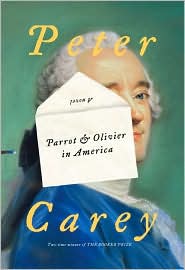 Adam Haslett is the author of You Are Not A Stranger Here, a short story collection, which was a finalist for a Pulitzer Prize and a National Book Award, and won the PEN/Winship Award. His work has appeared in The New Yorker, The Nation, Zoetrope, and Best American Short Stories as well as National Public Radio’s Selected Shorts.
Adam Haslett is the author of You Are Not A Stranger Here, a short story collection, which was a finalist for a Pulitzer Prize and a National Book Award, and won the PEN/Winship Award. His work has appeared in The New Yorker, The Nation, Zoetrope, and Best American Short Stories as well as National Public Radio’s Selected Shorts.His debut novel Union Atlantic was published last year.
For the Wall Street Journal, he named a five best list of deathless accounts of mourning. One novel on the list:
The Good SoldierRead about the other entries on the list.
by Ford Madox Ford (1915)'This is the saddest story I have ever heard," says the narrator, John Dowell, at the beginning of Ford Madox Ford's masterpiece about the disintegration of two marriages. Written on the eve of World War I and set in the medicinal spas and hotels of a vanishing world of British and European aristocracy, the book has plenty of loss to go around. By the end, Dowell's wife is dead, along with another girl, but in this deeply elegiac book it turns out the real grief isn't for the deceased but for the lost love and innocence of the Ashburnhams, the couple that the narrator and his wife met nine years earlier, whose lives they imagined to be perfect. It is the unraveling of this illusion, uncannily presaging the larger unraveling of Europe, that gives this novel its force. "It is not unusual in human beings who have witnessed the sack of a city," Dowell says, "to set down what they have witnessed ... just to get the sight out of their heads."
The Good Soldier also appears on John Mullan's lists of ten of the best spas in literature, ten of the best failed couplings in literature, and ten great novels with terrible original titles, and on the Guardian's list of ten of the best unconsummated passions in fiction. One line from the novel appears among Stanley Fish's top five sentences.
The Page 99 Test: The Good Soldier.
Visit Adam Haslett's website.
The Page 69 Test: Union Atlantic.
--Marshal Zeringue




































